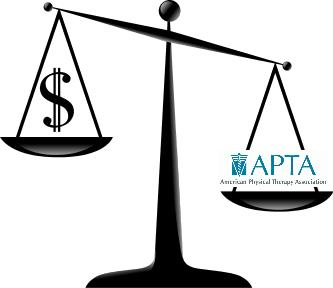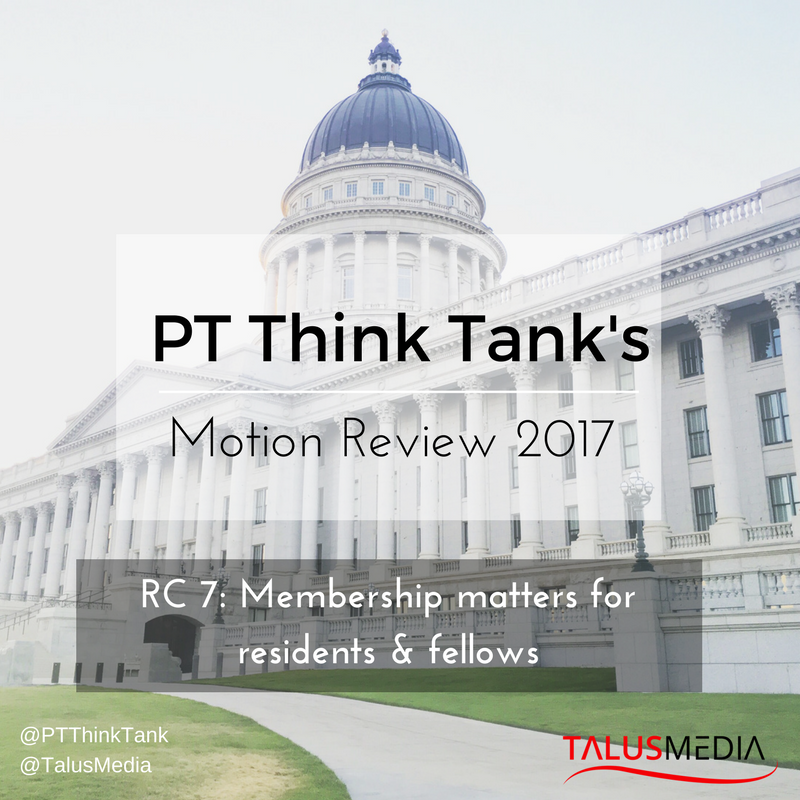
Motion RC 7-17 proposed by the Georgia chapter would support efforts of residency and fellowship programs accredited by the American Board of Physical Therapy Residency and Fellowship Education (ABPTRFRE) to encourage program participants to be members of both the APTA and their associated specialty section. The ABPTRFE is a department of the APTA. This department is funded by the APTA and subsidized by fees from accreditation, re-accreditation, applications, etc. At the moment, the American Academy of Orthopaedic Manual Physical Therapist (AAOMPT) fellowships strongly encourage APTA membership according to the AAOMPT 2011 Education standards. However, this one class of Fellows in Training (FiT’s) only account for a small percentage of all ABPTRFE accredited programs.
Currently, a policy mandating APTA and section membership is at the discretion of each individual program. This motion would not require those pursuing a residency or fellowship to become members, rather it allows the APTA to take a position supporting the efforts of programs to encourage membership. Physical therapy residents have a set of Core Competencies structured as a means to evaluate participant’s success in the program. The Professionalism core competency is defined as:
Conducts self in a manner consistent with the APTA Code of Ethics, inclusive of the Core Values, in all professional responsibilities and roles.
As members of the APTA, residents and fellows inherently meet many of these Core Competencies and gain access to resources that can contribute to their professional development.
Although this motion is a great step in supporting the association that protects and provides for our profession, does it go far enough? Would mandating membership on post-professionals increase animosity towards the APTA and decrease opportunities for one to develop a perceived value of membership? Does one engage more with the benefits of membership when joining voluntarily? The APTA’s ultimate goal is to gain members who value their membership.
In terms of mandating a membership for any or all segments of PTs, the proposal would be a daunting task. Mandatory membership would have to be pursued on a state-by-state basis, which raises the dilemma of who would be responsible for verifying one’s membership status. Suppose membership was tied to licensure, The Federation of State Boards of Physical Therapy (FSBPT) would experience a massive increase in administrative burden that wouldn’t necessarily increase the safety and/or competence of the PTs they are certifying.
Let’s set aside all the logistical and perhaps ethical issues surrounding a mandatory membership for residents and fellows and take a look at the numbers. Below is a table adapted from the “Minimum Eligibility Requirements and General Information for All Physical Therapist Specialist Certification Examinations”:
| APTA Member | Non-APTA Member | |
| Application Review Fee | $515 | $860 |
| Examination Fee | $800 | $1,525 |
| Total Fees | $1,315 | $2,385 |
As of 2007, the House recognized residents and fellows enrolled in an ABPTRFRE-credentialed program as a “Post-professional Student Member” with associated national dues of $150. However, even prior to this designation, it would still be financially irresponsible to pay over $1,000 more as a non-APTA member to obtain a clinical specialty. Regardless of your position in terms of how much you value APTA membership, the educational, as well as financial benefits of an APTA membership for residents and fellows, are tough to dispute. Please let us know your opinion on this and other motions and follow us on Facebook here.
References:
- American Physical Therapy Association. Packet I: Reference Committee 1-17. Alexandria, VA. 2016:27-28.
- ABPTRFE Core Competencies of a Physical Therapist Resident. American Physical Therapy Association Website.http://www.apta.org/uploadedFiles/ABPTRFEorg/For_Programs/Accredited_Programs/Core_Competencie/ResidencyCompetenciesEvaluationInstrument.pdf. Updated May 2016. Accessed May 20, 2017.
- ABPTS Minimum Eligibility Requirements and General Information for All Physical Therapist Specialist Certification Examinations. ABPTS Website. http://www.abpts.org/Certification/About/MinimumRequirements/. Updated Feb 17 2011. Accessed May 23, 2017
- American Physical Therapy Association. Bylaws: Article IV Section 1: Alexandria, VA. 2016: 1

